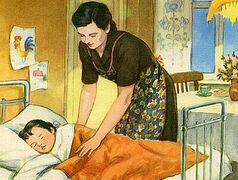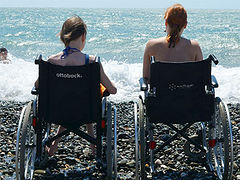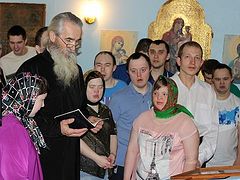A variety of programs are provided for children with disabilities to make their lives easier and improve their health. But when such children turn eighteen, they are most often left to themselves. Priest Vasily Orekhov, a cleric of the Church of St. Nicholas the Wonderworker “on Three Hills” in Moscow, decided to help such people find themselves in adulthood and teach them interesting and viable professions.
 —Father Vasily, what did you decide to do for people with disabilities?
—Father Vasily, what did you decide to do for people with disabilities?
—We came up with the idea of setting up a workshop, which children with mental or physical health problems could attend. We want to organize a space where they can learn a trade, earn money and fulfil themselves. For now, we have two workshops, sewing and ceramics.
—Why did you decide to work in this sphere?
—My son Ilya was born with a disease—whether congenital or acquired is still unclear. His birth opened up to us another world, which is usually hidden from most people. There we encountered pain, hopelessness, and at the same time hope, selflessness, and most importantly, love that gave us strength. The more I interacted with families who were raising children with special needs, the more visible the light that came through grief became. When the Lord sends you a trial, He gives you both the strength to endure it and special grace. If you are determined not to throw your cross away, but to carry it on, you will discover both joy and new possibilities in your soul.
Nevertheless, there is a lot of pain in the lives of such families. The most terrible stage is when people have just learned the diagnosis. They are not at all prepared for this news; they don’t know how to deal with such children; what the disease is like and what it brings with it. Many parents unwittingly make mistakes in raising such children, traumatizing both them and themselves.
—What kind of mistakes?
 Priest Vasily Orekhov —Someone tries to shield his child from everything that’s bad with his involvement and overprotection to make his life as easy as possible. This is not quite right—the child gets used to being constantly taken care of when everything is done for him. He grows up unadapted to difficulties—psychologists call this “learned helplessness”. And difficulties in life are inevitable. As a result, the child loses faith in himself. “I’m good-for-nothing—I can do nothing.” You need to approach them with a different message: “No, you can!” From my modest experience of work with such children I can say that they have good potential and can achieve more than they do now. With each lesson they gain self-confidence and awareness of the fact that, “Not only can I stay at home and while away the time, but also do what I and others like, and do it well.” This is important because children become more independent and less dependent on their parents.
Priest Vasily Orekhov —Someone tries to shield his child from everything that’s bad with his involvement and overprotection to make his life as easy as possible. This is not quite right—the child gets used to being constantly taken care of when everything is done for him. He grows up unadapted to difficulties—psychologists call this “learned helplessness”. And difficulties in life are inevitable. As a result, the child loses faith in himself. “I’m good-for-nothing—I can do nothing.” You need to approach them with a different message: “No, you can!” From my modest experience of work with such children I can say that they have good potential and can achieve more than they do now. With each lesson they gain self-confidence and awareness of the fact that, “Not only can I stay at home and while away the time, but also do what I and others like, and do it well.” This is important because children become more independent and less dependent on their parents.
Our project is relevant, because quite a few such children are born in our days. The severity of the illness varies from child to child. We decided to start with a group of children who are teachable.
 —What did you start your project with?
—What did you start your project with?
—Once in a boarding school for children with cerebral palsy I ran across a lady friend with whom we had not met for many years. We began telling each other what we were doing there. She confessed, “I feel joy when I come here. I get fulfillment from the fact that I can give something to these children.” And this is absolutely right—when healthy people give their energy, emotions and time to those with special needs, they first of all make someone else’s life better, and secondly, they themselves receive something in return.
When I had just begun to study the problem, I saw that one of its layers was society’s disinclination to accept disabled people. Society didn’t want to see them.
—Perhaps this is the rejection of one’s own fear, which a person experiences when he sees someone else’ illness.
 —Yes, “It’s better for us not to know about it.” I believe that we often hinder people precisely by not accepting them. Disabled people can get professions, but it is hard for them to find work. They have certain limitations in their activities, but nevertheless they know how to do something, and these skills allow them to sustain themselves and be full members of society. However, many of us don’t want people among us who remind us of sorrow. Work teams reject disabled employees, often at the level of bosses who begin to oppress them. So, the path that parents and medical and educational institutions have walked to put disabled children on their feet is a dead end. The sphere of adult life rejects them. A huge layer of problems falls on their shoulders—they are not loved; other people don’t want to see them and aren’t happy with them. So they don’t know what to do. By that time their parents, as a rule, reach retirement age, and their health declines. One day the point comes when these children are left on their own and no longer have an adult to support and guide them. This category of people is the most vulnerable. Many people help children with special needs, and when they reach the age of eighteen they should live independently—but they can’t, because the world around them doesn’t accept them.
—Yes, “It’s better for us not to know about it.” I believe that we often hinder people precisely by not accepting them. Disabled people can get professions, but it is hard for them to find work. They have certain limitations in their activities, but nevertheless they know how to do something, and these skills allow them to sustain themselves and be full members of society. However, many of us don’t want people among us who remind us of sorrow. Work teams reject disabled employees, often at the level of bosses who begin to oppress them. So, the path that parents and medical and educational institutions have walked to put disabled children on their feet is a dead end. The sphere of adult life rejects them. A huge layer of problems falls on their shoulders—they are not loved; other people don’t want to see them and aren’t happy with them. So they don’t know what to do. By that time their parents, as a rule, reach retirement age, and their health declines. One day the point comes when these children are left on their own and no longer have an adult to support and guide them. This category of people is the most vulnerable. Many people help children with special needs, and when they reach the age of eighteen they should live independently—but they can’t, because the world around them doesn’t accept them.
—How do you plan to deal with this problem?
—I decided that we could create a space in which they would feel independent and needed—this is very important for any human being to know that he doesn’t just live, but can do something useful. For such children it is necessary to realize that they can sustain themselves, understand what money is like and be able to manage it. I have set such tasks for myself. I cannot fulfil them globally, but on my modest level it is quite possible.
I want to create a place where these children will feel free and confident, where it will be interesting and they will win victories over themselves. We will teach them and help them in their work, making convenient work schedules. Their state of health doesn’t allow them to work eight hours a day, so we need a larger team to work in shifts. I would like to teach them not just to make simple things that will be bought out of mercy, but do something with high quality and beautifully. I see that they can do this—they just need patience and specialists to guide them. In St. Petersburg we find many examples of people with disabilities opening coffee shops where they cook and bring their own food, or make all sorts of handicrafts.
—What are you planning to teach your students?
—Initially we will have a sewing workshop. They will start sewing baptismal sets, which we plan to sell in different churches. A designer helps develop patterns and trains children; her employees will monitor the quality—this is a guarantee that we will establish the production of quality products. We are already receiving orders and agree to fill them. It’s not so hard, but later we will make our own product line—we’ll see what will sell better and what will be more interesting for buyers.
We started preparing for the project in the spring and launched training in the summer. The building in which we plan to work needs large-scale restoration—the Church of St. Nicholas “on Three Hills” has a room, which is a former prosphora bakery. In the Soviet era the building fell into disrepair, so its restoration requires considerable financial investments. We are looking for these funds and hope we can find them. So far, the Lifestyle Foundation has provided us with a temporary room, where we installed four sewing machines and began to teach children. Two groups have already been formed, and a third one is underway. In autumn I hope we will move from training to active work and fill the orders that we are receiving.
We post information about our project in social media and to communities of parents of disabled children. Word of mouth is already working, and there is rather a large response.
We are assisted by the Synodal Department for Charity of the Russian Orthodox Church, headed by Bishop Panteleimon (Shatov). Even in the summer when nearly everyone goes to dachas and sanatoria, there was an active response. Now we have reached our maximum, and we won’t be able to take in more children until we have our own premises. In addition to a sewing workshop, a ceramics shop is also planned and a group has already been formed, but since there is no room, we cannot start their training right away. People with mental disabilities are more interested in making ceramics, because they have figurative thinking, maybe even mythical. They will make ceramic tiles and souvenirs. We already have teachers, waiting for a space for work.
 In the future I would like to form another group of children aged twelve to fourteen, and maybe we will open a carpentry workshop as well. Working with natural materials, such as clay, wood and fabric, facilitates the development of fine motor skills, and these have a positive effect on the brain. Now we have a girl who was in a serious accident. Everyone thought that she would die—the girl was in a coma for five months. She survived, but remained disabled forever. Due to a craniocerebral injury she became visually impaired. Over the time of our training—and sewing requires concentration—the situation with her eyes has improved significantly, and even doctors have noticed this. And her hand got better—the spastic syndrome is gone.
In the future I would like to form another group of children aged twelve to fourteen, and maybe we will open a carpentry workshop as well. Working with natural materials, such as clay, wood and fabric, facilitates the development of fine motor skills, and these have a positive effect on the brain. Now we have a girl who was in a serious accident. Everyone thought that she would die—the girl was in a coma for five months. She survived, but remained disabled forever. Due to a craniocerebral injury she became visually impaired. Over the time of our training—and sewing requires concentration—the situation with her eyes has improved significantly, and even doctors have noticed this. And her hand got better—the spastic syndrome is gone.
—How many people will be able to find work in your workshop?
—I believe that in the future several dozen people will find work. We take in adults: now the youngest is seventeen, and the others are between twenty and thirty. They are very interesting people, each with his own destiny and path. We have already become friends: they accept us, and we accept them.
True, it is harder for disabled people than for healthy people, but they can also lead full, good lives. These people are often so bright and kind—you can seldom find such among healthy people. As you communicate with them, your soul rests. So it is imperative to go out into the outside world! It may be difficult, but you should overcome yourself, reaching new heights. This also applies to healthy people, but above all to those with special needs, because their close ones protect them from everything. They should have only surmountable challenges in their lives. Plus socialization—these people can’t find employment, their communication is often limited to their families and they have no friends. But here they have a work team, here they are accepted and welcome, and have joint communication after work. We sit, drink tea and talk together. They really like it and don’t even want to leave after our classes. And that’s valuable too. I myself feel that I already treat them not like disabled people, but like everyone else—this is the attitude I would like to see in society so in a disabled person we can see not just someone who needs help, but someone who is equal to us.
If you want to help the restoration of the building for the workshops, here is Fr. Vasily Orekhov’s Sberbank card number: 5336690147775318
Email: nikolskaya.master@gmail.com




